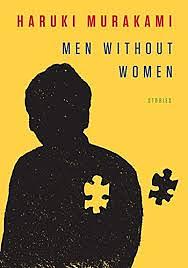Take a photo of a barcode or cover
emotional
reflective
sad
medium-paced
Plot or Character Driven:
A mix
Strong character development:
Yes
Loveable characters:
No
Diverse cast of characters:
No
Flaws of characters a main focus:
Yes
lighthearted
reflective
sad
slow-paced
Plot or Character Driven:
Character
Strong character development:
Complicated
Loveable characters:
No
Diverse cast of characters:
No
Flaws of characters a main focus:
Yes
emotional
hopeful
sad
fast-paced
adventurous
emotional
mysterious
reflective
slow-paced
3.5 ★ ★ ★½
There are some lines here and there that I think are achingly beautiful but for the most part, it only made me think "Mr. Murakami, it's passages like these that are questionable and make it hard to defend you!"
Favorites:
"Leaving who one was for a brief time, then returning. But the self that one returned to was never exactly the same as the self that one had left behind."
"Life is strange, isn’t it? You can be totally entranced by the glow of something one minute, be willing to sacrifice everything to make it yours, but then a little time passes, or your perspective changes a bit, and all of a sudden you’re shocked at how faded it appears."
"Like dry ground welcoming the rain, he let the solitude, silence, and loneliness soak in."
"At the time I felt as if every night I, too, were gazing out a porthole at a moon made of ice. A transparent, eight-inch-thick, frozen moon. But no one was beside me. I watched that moon alone, unable to share its cold beauty with anyone."
There are some lines here and there that I think are achingly beautiful but for the most part, it only made me think "Mr. Murakami, it's passages like these that are questionable and make it hard to defend you!"
Favorites:
"Leaving who one was for a brief time, then returning. But the self that one returned to was never exactly the same as the self that one had left behind."
"Life is strange, isn’t it? You can be totally entranced by the glow of something one minute, be willing to sacrifice everything to make it yours, but then a little time passes, or your perspective changes a bit, and all of a sudden you’re shocked at how faded it appears."
"Like dry ground welcoming the rain, he let the solitude, silence, and loneliness soak in."
"At the time I felt as if every night I, too, were gazing out a porthole at a moon made of ice. A transparent, eight-inch-thick, frozen moon. But no one was beside me. I watched that moon alone, unable to share its cold beauty with anyone."
reflective
medium-paced
Was it well written? Yes. Did I abandon all responsibilities this Sunday to finish this book? Perhaps. Is there an unexplainable yet familiar grief stuck at the back of my throat, waiting to escape? Possibly. If there's ever a good reason to learn Japanese, it would be to read his original work. There's definitely a distinct difference in tone and style between the different translations within this book. Still good. So fucking painful at the end of every story, so be sure to not read it in public spaces if you're a crybaby like me.
emotional
hopeful
reflective
sad
slow-paced
Plot or Character Driven:
Character
Strong character development:
Complicated
Loveable characters:
Complicated
Diverse cast of characters:
Yes
Flaws of characters a main focus:
Yes
Short story collections are hard to rate--even with a great author some in a collection might be 5s, and others more like 3. Not everything's going to hit you the same way. I went with a 4 on this one as even though there are some stories I didn't care for, four of the seven collected in the book are excellent and well worth the read, which is a strong average.
A ranking:
"Kino" is the best of the lot and gets a 5 from me. Many of the usual Murakami elements (bars with jazz records playing, cats, mysterious strangers arriving, etc.) put together in a way that's at first charming and comforting, only to critique and reveal a character who has frozen himself off from the world and even himself.
"Drive My Car" has a similar critique of its main character (who has a literal blindspot that keeps him from being able to drive anymore). This story's portrayal of Kafuku's grief, complicated by the knowledge of his wife's infidelity, is taken to another level by his being an actor--not just as a profession, but as he tries to get close to one of his wife's former lovers. 4.5-5 stars for me.
"Yesterday" is a bit goofy, but it's got the elements of nostalgia and living with the mistakes of your youth that makes Murakami's novel Colorless Tsukuru Tazaki worth reading as well. 4 stars for me, especially for the character of Kitaru, who's like the lovable, goofy friend you might find in a Coen Brothers movie.
You'll get more out of "Samsa in Love" if you know Kafka's The Metamorphosis, but if you have read it, it's an interesting conversation of sorts with the famous Kafka work. Rather than being Murakami's fanfic of the work (as I've seen suggested some places), it's something of a critique, or at least a moving beyond the bleakness of Kafka's novella (for all its humor, The Metamorphosis has a dim worldview). 4 for me as well.
"An Independent Organ" and "Scheherezade" had some potentially interesting elements but then just ended up reinforcing some of the male stereotypes and navel-gazing Murakami often gets accused of (sometimes rightly, sometimes not so rightly). Pretty disappointing when "Kino" goes a long way to critique the attitudes seen in the three weaker tales in this collection. Independent Organ rates a 2.5, but Scheherezade is at best a 1.
As for "Men Without Women," it's probably the worst short story I've read by Murakami. It has an intriguing opening but it sadly goes nowhere and nothing happens. Any writing workshop (or reader) would have begged Murakami to have some scenes and dialogue in here, anything to give the woman being remembered some life and agency, but it's almost all narration from the male main character's point of view, philosophizing about this woman and her husband. I can almost always find something interesting in his work, but this is a zero.
A ranking:
"Kino" is the best of the lot and gets a 5 from me. Many of the usual Murakami elements (bars with jazz records playing, cats, mysterious strangers arriving, etc.) put together in a way that's at first charming and comforting, only to critique and reveal a character who has frozen himself off from the world and even himself.
"Drive My Car" has a similar critique of its main character (who has a literal blindspot that keeps him from being able to drive anymore). This story's portrayal of Kafuku's grief, complicated by the knowledge of his wife's infidelity, is taken to another level by his being an actor--not just as a profession, but as he tries to get close to one of his wife's former lovers. 4.5-5 stars for me.
"Yesterday" is a bit goofy, but it's got the elements of nostalgia and living with the mistakes of your youth that makes Murakami's novel Colorless Tsukuru Tazaki worth reading as well. 4 stars for me, especially for the character of Kitaru, who's like the lovable, goofy friend you might find in a Coen Brothers movie.
You'll get more out of "Samsa in Love" if you know Kafka's The Metamorphosis, but if you have read it, it's an interesting conversation of sorts with the famous Kafka work. Rather than being Murakami's fanfic of the work (as I've seen suggested some places), it's something of a critique, or at least a moving beyond the bleakness of Kafka's novella (for all its humor, The Metamorphosis has a dim worldview). 4 for me as well.
"An Independent Organ" and "Scheherezade" had some potentially interesting elements but then just ended up reinforcing some of the male stereotypes and navel-gazing Murakami often gets accused of (sometimes rightly, sometimes not so rightly). Pretty disappointing when "Kino" goes a long way to critique the attitudes seen in the three weaker tales in this collection. Independent Organ rates a 2.5, but Scheherezade is at best a 1.
As for "Men Without Women," it's probably the worst short story I've read by Murakami. It has an intriguing opening but it sadly goes nowhere and nothing happens. Any writing workshop (or reader) would have begged Murakami to have some scenes and dialogue in here, anything to give the woman being remembered some life and agency, but it's almost all narration from the male main character's point of view, philosophizing about this woman and her husband. I can almost always find something interesting in his work, but this is a zero.
challenging
dark
emotional
reflective
sad
medium-paced
Plot or Character Driven:
A mix
Strong character development:
Complicated
Loveable characters:
No
Diverse cast of characters:
No
Flaws of characters a main focus:
Yes
This book left me with mixed emotions. Some stories, like An Independent Organ, were deeply interesting, while Men Without Women, for example felt too abstract for me.
It left me feeling melancholic and dazed. The sadness and vapid quality of loneliness really shine through, which feels especially poignant in light of the current male loneliness pandemic.
The lack of substance in the female characters, to me, serves a purpose within the context of the book. Loneliness and the lack of emotional intelligence in men are deeply linked to Murakami’s portrayal of women as mirrors or catalysts rather than full people. Its an accurate depiction of one possible reason why men are struggling so profoundly with loneliness.
Thought-provoking and emotive but not without its flaws.





